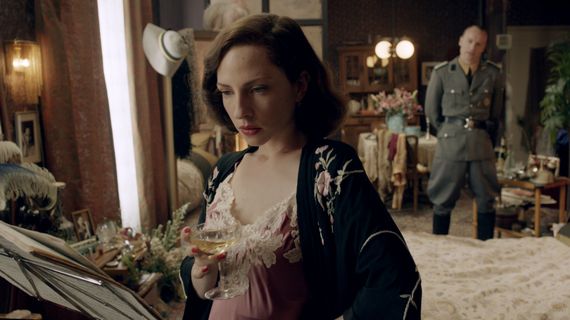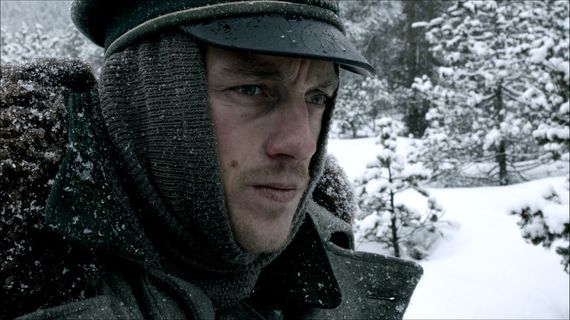Katharina Schüttler as Greta
If you ever wonder just how thin the veneer of civilization is, Generation War is a testament to the illusion of man's moral evolution. A searing portrayal of society's collapse of respect for human life, of the enormous losses of a war fought just a scant two generations ago, this film should keep viewers from buying any myths promoting the glory of war.
Generation War was made as a television mini-series, commissioned by Germany's public broadcasting organization, ZDF, and entitled Unsere Mütter, unsere Väter (Our mothers, our Fathers). It aired in Germany last spring with a record seven million viewers who, like the filmmakers, continue to grapple with the horrors of the older generation's role in World War II. The film's tagline reflects the conflict: What happens when the country you love betrays everything you believe?
Producer Nico Hofmann, along with Director Philipp Kadelbach and writer Stefan Kolditz, felt that the time was right to address with their parents and grandparents the experience of the Third Reich. Hofmann says of all the films he has made of the period, this is the most personal. It fulfills a long-time wish to portray his own family history: the character of Viktor recreates the story of his father, son of a Jewish tailor in Berlin.
Generation War opened in the US this month as a two-part film running 280 minutes, covering five years that feel like a lifetime. The saga opens in 1941 with five upbeat friends in their early twenties toasting their end-of-summer parting for wartime occupations. They take a photograph, each getting a print of the smiling faces, vowing to reconvene at Christmastime in Berlin. This is just the first of their misconceptions. Exceptional acting carries the drama, an arcing story that takes these well-drawn characters from personal hope and happiness to a place of no return.
Wilhelm Winter is the film's narrator, played beautifully by Volker Bruch. He is his father's son, an upright young officer, a believer in Hitler's goal of a 'final victory'. He leads his platoon to the Eastern front, intent on defeating the Russians. Hand-held camera work depicts the savagery of skirmishes in blown-out buildings, the explosive, erratic gunfire, the random fate of who lives and who doesn't, of how many lives are lost in the taking of a telegraph office.
Tom Schilling plays Friedhelm Winter, Wilhelm's younger brother, the conscience of the story. He is the bookish reader, a pacifist at the outset who has no enthusiasm for the war. But in the repeated heat of battle where he must either kill or be killed, he becomes an effective killing machine.
Ongoing combat yields little but enormous losses- the platoon looses 40% of its men- and when the new recruits arrive and introduce themselves, Friedhelm tells them that if they survive the week, he'll call them by name. "Until then, you're number one, you're two." After a particularly bloody massacre, Friedhelm tells his brother in a rage, "It's all been a mistake from the beginning. There is no point. God has forsaken us."
Ludwig Trepte plays Viktor Goldstein, son of a Jewish tailor. He understands the danger in remaining in Nazi Germany and pleads with his parents to leave, but his father has blinders on and refuses to recognize the threat. He sews a yellow Star of David badge onto a jacket, parroting the explanation that it's for their 'protection.'
Viktor and Greta Müller (Katharina Schüttler) are committed to each other, but when Viktor goes off with the army, Greta turns her focus to her singing career. As the war progresses and trainloads of Jews disappear out of the city and return empty, she will do anything to save Viktor. Greta is ambitious, and when an SS officer offers to make her the next Marlene Dietrich, she trades this opportunity for Viktor's exit papers. This barter ends up costing her far more than she bargained for.
Miriam Stein plays Charlotte, a nurse assigned to the Eastern Front who is in love with Wilhelm. The youthful innocence she starts with turns on her when she reports that her capable Ukrainian assistant, Lilija, is a Jewish physician. This act, committed in the name of national loyalty, haunts her and she later confesses to sending Lilija to her death. In a twist of fate, Lilija later reappears as an officer of the invading Russian troops and saves Charlotte from rape by a soldier. Charlotte asks her, "Why are you helping me?" Lilija answers, "Because if we don't help each other we will never move forward."
Small acts of mercy like this pepper the long stretches of carnage depicted in the film. For the most part, personal integrity is lost in the animal savagery of war- Germans, Russians, Poles, Ukranian partisans- all are reduced to beasts in the name of national patriotism. Even when the war is all but ended, they continue their senseless slaughter.
Wilhelm eventually agrees with his brother, "War brings out the worst in us." The film depicts the corrupting influence of desperation, the limits people will exceed in trying to stay alive. One character on the eastern front says, in support of urging the troops on, "Do you know what the Russians will do to us if they win?" The photograph of five young faces is folded, torn and mutilated, its individuals corrupted and damaged far beyond anyone's imaginings.
The questions raised by Generation War seem apt right now not just because of the aging population of Germans with a personal memory of the devastation of WWII, but because of the volatile state of global affairs. The rash of pro-war movies in American theaters is alarming, with trailers promoting soldiering and the honorable camaraderie of war buddies. How soon is history forgotten?
No society is exempt from war crimes. With all bets off as to civilized conduct, wartime provides a green light for institutionalized violence, which often intensifies to needless cruelty. To name a few, we Americans can count the Viet Nam war's My Lai Massacre, the two years of atrocities at Abu Ghraib, or the current rate of rape in the American military which has sky-rocketed with thousands of reports a year. Why do we as informed citizens allow these abuses to continue?
Generation War is an exploration of a specific war as well as an indictment against all wars. The film is a cautionary tale that makes very clear the high cost of political contests played out on the battlefield.
Volker Bruch as Wilhelm Winter

